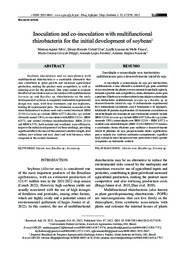Inoculation and co-inoculation with multifunctional rhizobacteria for the initial development of soybean.
Inoculation and co-inoculation with multifunctional rhizobacteria for the initial development of soybean.
Author(s): SILVA, M. A.; CRUZ, D. R. C.; FRASCA, L. L. de M.; FILIPPI, M. C. C. de; FERREIRA, A. L.; NASCENTE, A. S.
Summary: Soybean inoculation and co-inoculation with multifunctional rhizobacteria is a sustainable alternative that may contribute to plant growth and increased agricultural production, making the product more competitive, as well as reducing costs for the producer. This study aimed to evaluate the effect of inoculation and co-inoculation with multifunctional Serratia sp. and Bacillus sp. rhizobacteria on the early development of soybean. A completely randomized experimental design was used, with four treatments and ten replicates, totaling 40 experimental plots. The treatments consisted of the microbiolization of soybean seeds and a control treatment: BRM 32114 (Serratia sp.) isolate; BRM 63573 (Bacillus sp.) isolate (formerly named 1301); co-inoculation with BRM 32114 + BRM 63573; and control (without microbiolization). BRM 32114 and BRM 63753, both isolated and combined, were eficient to improve the initial development of soybean seedlings, providing significant effects for most of the analyzed variables (length, total surface, root volume and root, shoot and total biomass), when compared to the control treatment.
Publication year: 2022
Types of publication: Journal article
Unit: Embrapa Rice & Beans
Keywords: Bacillus sp, Glycine Max, Inoculation methods, Inoculação, Rhizobacteria, Serratia, Soja, Soybeans
Observation
Some of Embrapa's publications are published as ePub files. To read them, use or download one of the following free software options to your computer or mobile device. Android: Google Play Books; IOS: iBooks; Windows and Linux: Calibre.
Access other publications
Access the Agricultural Research Database (BDPA) to consult Embrapa's full library collection and records.
Visit Embrapa Bookstore to purchase books and other publications sold by Embrapa.

